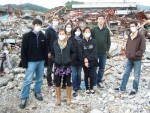Title
Last spring’s Tohoku earthquake and tsunami claimed close to 30,000 lives, destroyed or damaged 125,000 buildings, and spurred a massive, level-7 nuclear disaster. Relief has come slowly for most survivors, with around 87,000 people still living in shelters. How can words sufficiently describe or even conceptualize that which has happened in Japan? In addition, as many as 531,000 foreigners immediately fled the country, perhaps adding a sense of isolation for an already beleaguered nation.
Body
These terrible events motivated a team of 10 Juilliard students to give fund-raising concerts to support relief efforts and pay our own way to Japan in May to give free concerts for earthquake victims. The team comprised current fourth-years Max Blair, oboe; Sean Kennard, piano; Soo Yeon Kim, violin; and Rachel Li, viola; D.M.A. candidate Stephanie Wu (B.M. ’08, M.M. ’10, piano); and alumni Michael Katz (M.M. ’11, cello), Joe Lee (B.M.’06, M.M. ’08, cello), Alex McDonald (M.M. ’08, D.M.A. ’11, piano), and Hanah Stuart (B.M. ’10, M.M. ’11, violin)—all of whom were members of the Juilliard Christian Fellowship (J.C.F.). We were also joined by a Manhattan School of Music pianist, Luka Oida. (And we were helped immeasurably by Juilliard Dean Emeritus Stephen Clapp.)
Following the earthquake Roger Lowther (M.M. ’98, organ), our main contact in Japan, had been working tirelessly with his family and Grace City Church Tokyo to deliver food and clothing to the thousands of people housed in shelters. By May, government and private organizations had distributed most necessary food and clothing, and we were notified that the shelters were seeking relief beyond these essential items. They now desperately needed music, joy, community, and a way to begin to process the devastation of seeing everything they knew literally washed away.
We planned to go immediately after graduation, though family and friends worried that we were putting our lives at risk from radiation, aftershocks, and other, unknown factors. But Michael Katz summed up our twin incentives: our roles as artist citizens as defined by President Joseph Polisi (“giving when it is needed, not after”) and as Christians (“Jesus gave his all for us”).
At our first concert at the Watanoha elementary school shelter in Ishinomaki, a mild typhoon knocked out the power, necessitating the use of flashlights. Entering these shelters with a load of instruments, stands, and amplifiers, we were very aware of our performance space so as not to intrude on the only “home” our audience members had left: 10-by-10-foot squares delineated by cardboard boxes in a school gym. After the concerts concluded, some residents shared their stories of loss and survival. Others eagerly requested favorite tunes, such as Bach’s Air on G; upon hearing a familiar Japanese folk song, “Furusato” (“Homeland”), many wept and recalled what they had lost. Playing music for people who were suffering so acutely made us realize that sometimes music is not so much about performing as it is about sharing.





